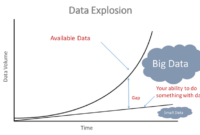Cloud data storage revolutionizes the way we store and manage data, offering unparalleled benefits and flexibility in a rapidly evolving digital landscape. From enhanced security measures to seamless data migration, explore the intricacies of cloud storage solutions that cater to modern business needs.
Overview of Cloud Data Storage
Cloud data storage refers to the practice of storing data on remote servers accessed through the internet, instead of storing it locally on physical hardware. This allows users to access their data from anywhere with an internet connection, making it a flexible and convenient storage solution.
Benefits of Using Cloud Storage
- Scalability: Cloud storage services offer the flexibility to scale storage capacity up or down based on the user’s needs, eliminating the need to invest in additional hardware.
- Accessibility: Data stored in the cloud can be accessed from any device with an internet connection, making it easy to collaborate and work remotely.
- Cost-effectiveness: Cloud storage eliminates the need for upfront hardware costs and reduces maintenance expenses, making it a cost-effective solution for businesses of all sizes.
- Security: Most cloud storage providers offer robust security measures to protect data from unauthorized access, ensuring data integrity and confidentiality.
Types of Cloud Data Storage Services
- Public Cloud Storage: Public cloud storage services are offered by third-party providers over the internet, allowing users to store and access their data on shared servers. Examples include Amazon S3, Google Cloud Storage, and Microsoft Azure.
- Private Cloud Storage: Private cloud storage involves dedicated servers and infrastructure for a single organization, providing enhanced control and security over data. Organizations can choose to deploy private cloud storage on-premises or through a third-party provider.
- Hybrid Cloud Storage: Hybrid cloud storage combines elements of public and private cloud storage, allowing organizations to leverage the benefits of both environments. This approach enables seamless data migration and scalability while maintaining control over sensitive data.
Types of Cloud Data Storage

In the realm of cloud data storage, there are several types of solutions available to cater to different needs and requirements. Let’s delve into the distinctions between public, private, and hybrid cloud storage options, as well as the variances between object storage and block storage in the cloud, along with the significance of network-attached storage (NAS) in cloud data storage.
Public, Private, and Hybrid Cloud Storage Solutions
Public cloud storage involves services provided by third-party providers over the internet, allowing users to access and utilize storage resources on a pay-as-you-go basis. Private cloud storage, on the other hand, is dedicated to a single organization and is typically managed on-premises or by a third-party service provider. Hybrid cloud storage combines elements of both public and private cloud solutions, offering flexibility and scalability while maintaining control over sensitive data.
Object Storage vs. Block Storage in the Cloud
Object storage in the cloud stores data as objects, each containing metadata that provides information about the data itself. This approach is ideal for storing unstructured data like photos, videos, and documents. In contrast, block storage divides data into blocks and stores them in a structured manner, making it suitable for databases and applications that require frequent read/write operations.
Role of Network-Attached Storage (NAS) in Cloud Data Storage
Network-attached storage (NAS) serves as a centralized storage solution that connects to a network, allowing multiple users and devices to access data simultaneously. In cloud data storage, NAS can provide additional storage capacity, data backup, and file sharing capabilities, enhancing collaboration and data accessibility for organizations.
Security Measures in Cloud Data Storage

Ensuring the security of data stored in the cloud is crucial to protect sensitive information from unauthorized access and cyber threats.
Common Security Threats in Cloud Data Storage
When it comes to cloud data storage, there are several common security threats that organizations need to be aware of:
- Data Breaches: Unauthorized access to sensitive data can result in data breaches, leading to potential data loss or leakage.
- Malware and Ransomware Attacks: Malicious software can infect cloud storage systems, compromising the integrity of data.
- Insider Threats: Employees or individuals with access to the cloud storage system may intentionally or unintentionally misuse data.
Encryption Techniques in Cloud Data Storage
Encryption plays a vital role in securing data in the cloud by converting information into a code that can only be accessed with the correct decryption key:
- End-to-End Encryption: This method ensures that data is encrypted before it leaves the user’s device and remains encrypted until it reaches its destination.
- At-Rest Encryption: Data stored in the cloud is encrypted while it is at rest, providing an additional layer of security.
- Transport Layer Security (TLS): TLS protocols encrypt data while it is in transit between the user’s device and the cloud storage server.
Importance of Data Redundancy and Disaster Recovery in Cloud Storage
Data redundancy and disaster recovery are essential components of cloud storage to ensure data availability and business continuity:
- Data Redundancy: Storing multiple copies of data across different servers or locations helps prevent data loss in case of hardware failures or system crashes.
- Disaster Recovery Planning: Having a robust disaster recovery plan in place ensures that data can be recovered quickly in the event of a natural disaster, cyber attack, or system failure.
- Regular Backup: Regularly backing up data to secure cloud storage ensures that important information is protected and can be restored if needed.
Data Migration to the Cloud
![]()
When a company decides to move its data from on-premises storage to the cloud, it involves a complex process that requires careful planning and execution. Data migration to the cloud is crucial for organizations looking to take advantage of the scalability, flexibility, and cost-effectiveness that cloud storage offers.
Process of Migrating Data
- Assessment: Conduct a thorough assessment of the data to be migrated, including its volume, type, and sensitivity.
- Planning: Develop a detailed migration plan outlining the steps, timeline, and resources required for a successful migration.
- Data Transfer: Transfer the data to the cloud using secure and efficient data transfer protocols.
- Validation: Verify the integrity and completeness of the migrated data to ensure no loss or corruption.
- Optimization: Fine-tune the cloud storage configuration to optimize performance and cost-efficiency.
Challenges and Best Practices
- Challenges: Data migration can be complex, time-consuming, and prone to errors such as data loss or corruption.
- Best Practices: Implement data encryption, use reliable migration tools, conduct thorough testing, and involve stakeholders throughout the process.
Role of Data Transfer Protocols
Data transfer protocols play a critical role in efficient data migration to the cloud. Protocols like HTTPS, FTP, or SCP ensure secure and reliable transfer of data between on-premises storage and cloud servers. Choosing the right protocol based on data volume, speed requirements, and security considerations is essential for a seamless migration process.
In conclusion, Cloud data storage stands as a beacon of innovation, providing a secure and efficient platform for businesses to thrive in the digital era. Embrace the power of the cloud and unlock limitless possibilities for your data storage needs.
Business reporting plays a crucial role in enhancing decision-making through data. By analyzing and presenting key business metrics, stakeholders can make informed decisions that drive growth and success. Utilizing advanced reporting tools and techniques can provide valuable insights that guide strategic planning and resource allocation. Learn more about Business reporting Enhancing Decision-Making Through Data to stay ahead in today’s competitive business landscape.
Analytical dashboards are powerful tools that unlock data insights for business success. These interactive visualizations allow users to explore data, identify trends, and uncover opportunities for optimization. By leveraging analytical dashboards, organizations can make data-driven decisions that drive growth and profitability. Discover how to harness the power of data visualization with Analytical Dashboards Unlocking Data Insights for Business Success to elevate your business performance.
Data-driven reports are essential for making informed decisions with data. By collecting, analyzing, and interpreting data effectively, businesses can gain valuable insights that drive strategic decision-making. Data-driven reports enable organizations to track performance, identify opportunities for improvement, and optimize processes for maximum efficiency. Explore the importance of data-driven decision-making with Data-driven reports Making Informed Decisions with Data to propel your business forward.



